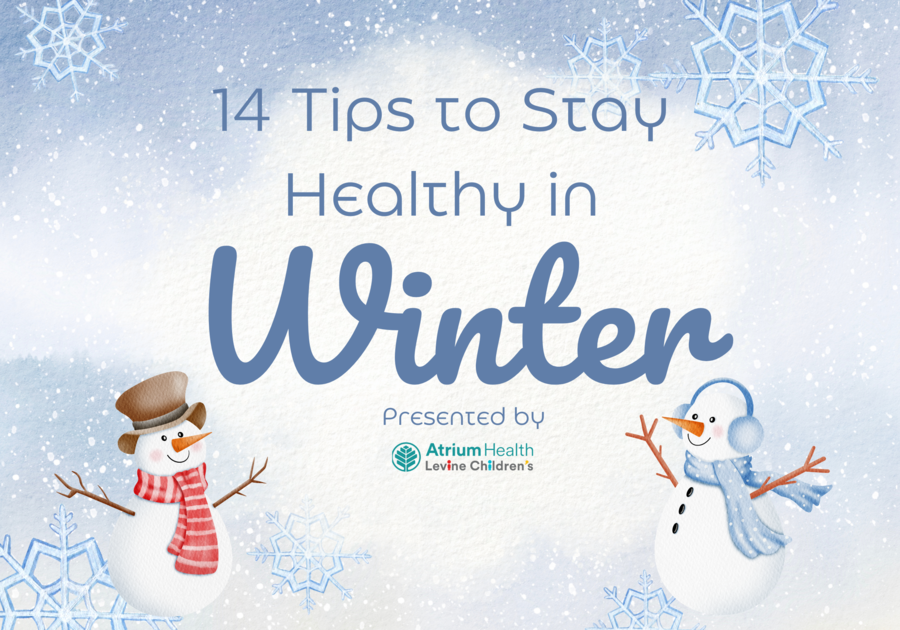The winter months can be so much fun for your children and family from cozy forts inside, to sledding, and building snowmen. But, between the elements (cold, snow, rain) and the types of spaces you play (indoor play spaces, trampoline parks, snow tubing or sledding) keeping your child safe and healthy in the winter months can also be hard - though not impossible! Dr. Nandita Singh a pediatrician at Atrium Health Levine Children’s Providence Pediatrics, says, “Keeping your kids safe and healthy in the winter months is just as important as it is during the rest of the year.”
Physical Safety
Whether playing indoors or out, winter weather can create unique challenges and amazing opportunities. Common injuries in the winter months include sprains, concussions, dislocations and fractures. It’s important to know where to go if your child gets injured. “Take your child to the Emergency Department for concussions, fractures, dislocations and lacerations that require suturing,” says Singh. She also encourages parents to be vigilant when it comes to colder temperatures. “Making sure your child is dressed and prepared for the elements - especially in places like Charlotte, where we aren’t used to severe cold weather - is imperative,” shared Singh.
Here are 7 tips to help keep your child(ren) safe this winter:
- Adjust winter clothes for children’s needs. Dress babies and young children in one more layer of clothing than an adult would wear in the same conditions.
- Keep exposure to the cold at a minimum. Babies and young children don’t have the same tolerance for cold that adults do. Shivering, wet clothes and skin discoloration are all signs that it’s time to come inside to warm up.
- Prevent nosebleeds. If your child suffers from minor winter nosebleeds, use a cold-air humidifier in their room. Saline nose drops can help keep their nose moist.
- Wear a helmet and other safety equipment when participating in outdoor winter activities, like skiing and sledding.
- Offer plenty of water, and try giving them warm drinks and soup to keep warm.
- Use sunscreen. Children and adults can still get sunburned in the winter. Sun can reflect off the snow, so apply sunscreen to exposed areas.
- Make sure to wear hats, gloves, and other protective clothing when going outside; but also ensure they are worn properly during appropriate times - as some accessories can be hidden dangers for young children (scarves, hats, etc.).

Immuno Safety (Illness Prevention)
Let’s face it, when the weather is cold or wet, we don’t always WANT to be outside. The good news is that the Charlotte area also has tons of indoor options. That said, “indoor spaces are rife with germs and bacteria, so lots of handwashing is critical,” Singh shared. Sickness might happen, but it isn’t inevitable! You can help keep those germs away.
Here are 7 tips for keeping your child(ren) healthy during the winter months:
- Make sure your kids eat healthy foods like fruits and veggies that have healthy nutrients that help fight colds. Also consider giving them a multivitamin.
- Consider wearing a mask in appropriate settings.
- Get immunized. Keep vaccinations current, including the flu shot (for children 6 months and older).
- Use soap and water. Washing their hands frequently will reduce the spread of germs.
- Keep them hydrated. Kids lose more water through their breath in dry winter air.
- Colder temps often means more screen time and snacking. Try to limit both and encourage physical activity.
- Get enough sleep. Aim for around 9 to 11 hours of sleep a night for school age children, and 8 to 10 hours for teens.

So what should you do if your child starts showing symptoms of illness? Dr. Singh says,
“When kids begin to show symptoms, monitor them for the first day if they’re not severe. If you have questions or concerns, it’s always important to contact your provider so they can guide you in the right direction.” She suggests you use over-the-counter medicines like acetaminophen or ibuprofen for pain or fever and ensure that your child is hydrated and well-rested. “If your child is not improving or their symptoms are worsening, they should see their pediatrician as soon as possible.”
 |
And, if you are questioning your child’s health after time outside or even wondering if that cough is something more substantial after playing indoors, Levine Children’s makes it easy to contact your pediatrician. To learn more about pediatric care at Levine Children’s, visit online.
Winter months in the Charlotte area are some of the best - there is much to do and since the climate is moderate most of the time - it’s easy to spend time outdoors. Take advantage of the fun, but make sure you and your children are safe and healthy.


